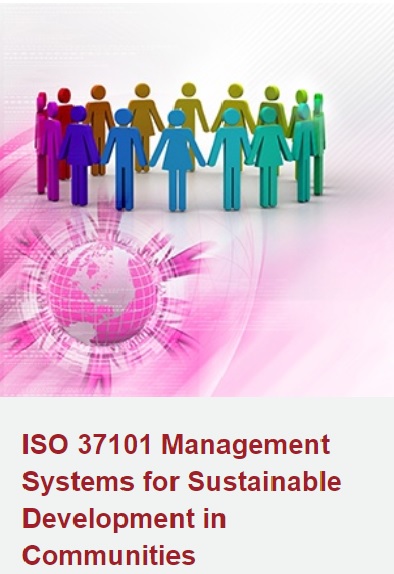Sustainability and environmental protection are the paramount needs of the day. We are offering the following training programs to promote the same.
ISO 37101 is an international standard that specifies the requirements of and provides guidance on the establishment of a management system for sustainable development in communities. The standard aims to help communities establish a framework that allows them to improve their standing in their social, economic and environmental aspects. The requirements of the standard can be applied to communities of all sizes in their sustainable development efforts towards smart, more resilient and more efficient infrastructure and ultimately help improve their overall well-being. The standard addresses specific sustainability issues such as governance, education, innovation, health care, interdependence, safety, inclusivity, etc., and has the flexibility of adding other sustainability issues which may prove relevant to the community implementing it.
Alongside the issue of the depletion of finite resources (shortages of clean/drinking water, deforestation, infertile soils, food shortages, etc.), the issue of sustainable development is taking a global and eminent character. Our current way of living is not sustainable, and it will unavoidably leave younger generations with the burden of resource exhaustion. As such, it is imperative that we change our way of living and make our communities around the globe more sustainable. We offer the following training programs.


ISO 20400 is an international standard that provides guidelines on sustainable procurement. The standard can be used by organizations that intend to improve their social, economic, and environmental sustainability.
The standard’s main guidelines include key sustainability considerations, integrating sustainability into the organization’s procurement policy and strategy, managing risks and opportunities, planning and integrating sustainability into the procurement processes, and measuring and improving sustainable procurement performance. Throughout all these instances, the engagement of stakeholders is just as important for sustainable procurement initiatives to be successful. Therefore, considerable attention is given to the engagement of stakeholders throughout the supply chain.
We offer the following training:
ISO 20400 Lead Manager
ISO 14001 is a widely recognized international standard that specifies the requirements for organizations that want to enhance their environmental performance and increase their operational efficiency. The framework that is based on ISO 14001 will help organizations manage their short-term and long-term processes through the use of efficient resources, which will have a positive impact on the environment. We offer the following training programs.


ISO 22000 is a globally accepted international standard, which specifies the requirements for food safety management systems. Established in 2005, ISO 22000 is applicable to all organizations involved in the food chain, whose main objective is to ensure food safety. The standard outlines a framework which harmonizes all parts of the food supply chain, from producer to consumer, and helps you reduce food hazards, control the risks and prevent contamination. We offer the following training programs.
ISO 26000 is an international standard, which was developed to provide guidance on how to behave in a socially responsible way. This standard is applicable to all organizations, whose aim is to contribute to the health and well being of society, regardless of their size or industry. ISO 26000 is a guidance standard that helps organizations to enhance their operational processes and ensure healthy ecosystem. We offer the following training programs.
Introduction Training
Foundation Training
Lead Implementer Training
Lead Auditor Training

For obtaining more information on ISO training and certification programs, please contact isotraining@suraksha.us

